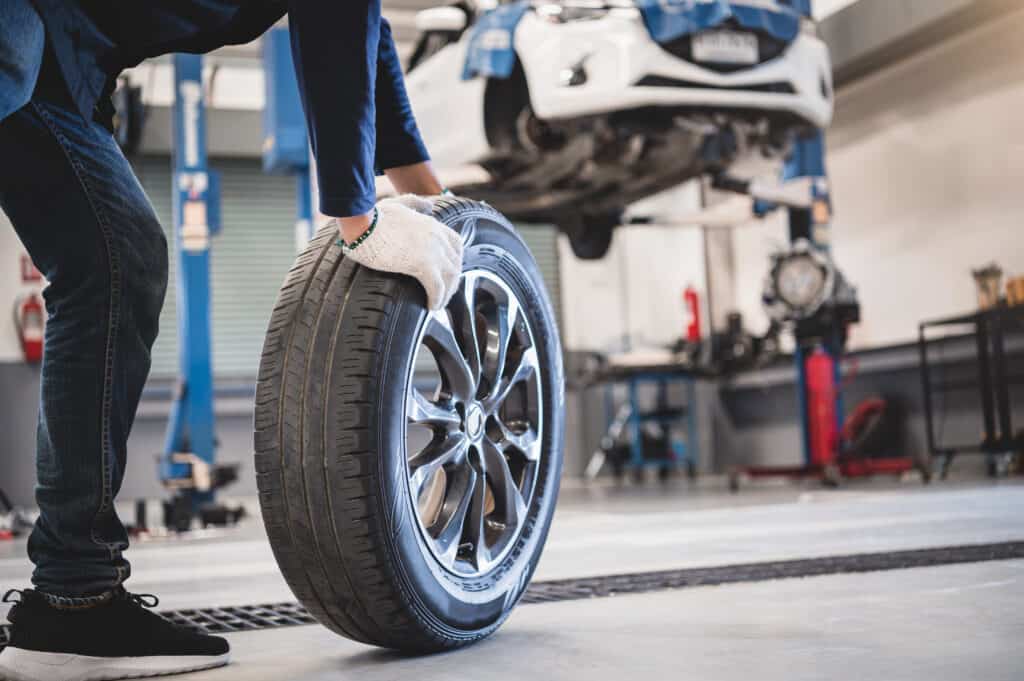No matter what sort of motor trade business you’re running – be it a car dealership, body shop, service and repair garage or an MOT station – you’ll want to keep your costs down. Motor trade insurance is one of your business’s biggest costs, so it’s worth spending a little time to find out how you can get cheaper motor trade insurance.
To help you do that, here’s our guide as to how motor trade insurance premiums are calculated and our top tips for saving on your motor trade insurance quotes.
You may be surprised that there are 25 ways to save on motor trade insurance quotes, but that reflects the complexity of the cover. Depending on which services you’re offering, whether you need full-time or part-time motor trade insurance or are trading from home, an insurer may need to consider:
- The turnover of your business.
- The wage roll of your business.
- Your business’s postcode.
- Your claims history.
- The value of your stock and parts.
- Your age.
- If you trade from premises.
- If you have any employees.
- The level of cover you require – road risks or motor trade combined.
- The value of your equipment.
- If you need tools in transit cover.
- The type of services you offer.
- Whether you want to pay monthly or annually.

25 ways to save on motor trade insurance
Scroll through the tips, they are worth reading!
1. Think about who you’re insuring
Choosing a ‘Named Driver’ policy rather than an ‘Any Driver’ can also cut the cost of cover. Some any driver policies also stipulate that drivers must be 30 years old or over, so a named driver policy may be your only choice.
Restricting the social, domestic, and pleasure element of your cover is another way of bringing down your premiums.
When hiring people, ask them about their claims history and ask to see their licence so you can check if they have any endorsements. When they leave the business, make sure you let your broker know so they can adjust your policy for you. Afterall, there’s no point paying for cover for people who are no longer with you.
“Customers should consider if all employees need to drive under the policy. Restricting social domestic, and pleasure use and removing young drivers is an excellent way to reduce overall insurance costs.”
Michael Peacock, Sales Director, Jensten Motor Trade
2. Raise your excess
It’s worth noting that some policies do come with what is known as a ‘voluntary excess’, which is something you can choose to add alongside your compulsory excess, which is set by insurance companies. The combination of any voluntary excess along with the compulsory excess will be payable in the event of a claim. You’ll only be able to increase your excess on policies that have a ‘voluntary excess’ level.
By adding a voluntary excess – the amount you pay in the event of a claim – is a quick and easy way of reducing the price of your motor trade insurance premiums. For example, by raising your excess from a standard £350 on a combined policy to a £1,000 excess you could be offered a reduced premium depending on the insurer. An insurance broker specialising in motor trade will be able to advise on different premiums based on varying excess levels and will happily share the options with you.
3. Get excess protection
Excess protection insurance is a specialist cover that will cover your excess if you decide to make a claim. By reimbursing your excess, excess protection allows you to opt for a higher excess, so potentially saving you money.
4. Build up and protect your no-claims bonus (NCB)
Whereas nothing will push up your costs like a claim, not making a claim and building up your NCB is a good way to reduce your
Some insurers will allow you to mirror your private car’s no-claims bonus on a road risks motor trade policy. You can also protect your no-claims, and while this won’t cut your premiums, it will protect you from potentially expensive premium hikes down the road if you need to make a claim.
Make sure you have proof of your no claims bonus as a new insurer will generally want to see it. Keep your renewal documents somewhere safe and when you come to shop around for a new motor trade insurance quote, you’ll have the evidence you need to hand.
Also, ask your broker whether they have any insurers that offer a higher no claims discount. Typically, an insurer will cap the no-claims bonus at five years, but some will allow you up to seven years. If you can get this level of discount, it can save you money in the long term.
Please note: protected no claims is only available for road risk policies, not for motor trade combined cover.
5. Keep claims to a minimum
Whatever you do about your excess, it pays to keep claims to a minimum. While a protected excess will make it easier to make small claims, these will be noted by your insurer and over time you are likely to see your premiums rise.
6. Get some independent advice from a specialist motor trade insurance broker
Motor trade insurance is a complex area of the market, and it pays to get specialist independent advice. While a general insurance broker may be able to offer motor trade car insurance, that doesn’t make them specialists in the field. Insurance brokers are like any other business in that they will have areas of expertise. It’s important to know what these are if they are to give you the protection your motor trade business
The motor trade industry is also a diverse one with traders looking for everything from combined motor trade insurance to part-time motor trade insurance and road risks insurance.
We say several insurers advisedly. Not only does it give you a choice, but as some insurance companies will have exclusive schemes and specific arrangements, it’s rare to find one that has everything that everybody needs.
The Jensten Motor Trade team, for example, have over 30 years of experience in helping motor traders with motor trade insurance, and has access to the specialist insurers who offer motor trade insurance. Because not all motor trade insurance policies are the same if your broker offers you a number of options, then you can take that as a good thing, as it means they are looking at various markets to find you cover that is suitable for your business.
7. Shop around
But limit the number of brokers you approach. – Do your research and contact one or two specialist independent motor trade insurance brokers. While it’s tempting in this internet age to fire off enquiries to several brokers, it’s an approach that could backfire. If you have a load of brokers asking for quotes on the same risk, you could end up saturating the market, which could, in turn lead to insurers failing to respond.
Ask other people in the motor trade, they’ll recommend brokers. Or search for an FCA-registered insurance broker, such as Jensten Insurance Brokers, to do the shopping around for you. With their motor trade knowledge, they’ll be able to save you time getting the cover you need.
As we’ve said it pays to take the time to find a broker who specialises in this form of cover. While a Google search will bring up hundreds of listings for businesses offering motor trade insurance quotes, not all of these are even insurance brokers, let alone specialist trade motor insurance brokers.
Many of these websites are simply in the business of capturing personal data that they will sell on to multiple insurance brokers at the same time. As a motor trader, you don’t choose which broker contacts you, so you need to be vigilant on which companies you divulge information to. While some of these brokers may be motor trade specialists, some will not, and they may be unable to offer you the independent advice and dedicated cover you need. This can lead to a flurry of calls within a short space of time.
Take our advice. If you’re looking forthen get a quote from your current provider and two other independent brokers that specialise in trade motor insurance. This will allow you to compare the level of cover offered and the overall cost of the premiums quoted, making the process manageable and give you the chance to speak to them, get their advice and allow them to explain how the cover compares to your current policy (if you have one).
Generally speaking, shopping around rather than accepting your broker’s renewal offer makes sense. This is particularly important at the moment as insurance companies are becoming more risk-averse, and prices are rising owing to inflation and other cost pressures. The disruption to supply chains following the pandemic is still having an impact on premiums, and things like rising prices of parts, longer vehicle repair times, and the increased costs associated with Brexit are also being passed on. Add to this mix the surge in energy prices and general inflation pushing up wage costs, and we’ve seen some insurers upping their quotes by as much as 25%.
Levels of premium inflation haven’t been universal, however, and you can keep costs down if you talk to a broker with specialist motor trade insurance knowledge and access to the market of Motor Trade Insurers.
8. Only pay for what you need
Another good reason for getting your motor trade insurance from a specialist independent broker is that they can ensure you get the cover you need and don’t pay for things you don’t. Policy elements like higher indemnity limits or additional covers could mean you’re wasting money paying for cover you don’t need.
9. Consider the types of vehicles you’re working with
Working with high-value performance cars, rare classic cars, and certain types of imported or modified vehicles can increase your insurance quotes. As theft attractive vehicles, if they are damaged or stolen, it can prove costly to put things right.
As these vehicles can be a magnet for thieves they can significantly reduce your ability to get cover. If you have young drivers, a poor claims history, or just happen to be unlucky with your business’s postcode, this could be an element that makes your business too risky to insure.
10. Limit or avoid non-sales activities such as breakdown and recovery and vehicle transport
The more services you offer, the more risks you run, and the higher your insurance quotes are likely to be. If your motor business is solely concerned with buying and selling vehicles – especially if you’re trading from home – then your risk profile will likely be lower than if it offers repairs, recovery, and vehicle deliveries.
11. Make sure your vehicles and premises are secure
Vehicle thefts have rocketed in the past year, with the Office for National Statistics reporting a 24% increase in 2023. This means your stock is at significant risk and investing in security can not only help you get cheaper motor insurance but reduce the chances of your business being disrupted by thefts.
While security systems don’t have to be expensive – you can get a basic camera on Amazon for under £50 – we would recommend researching the range of products available. Rising bollards, wheel clamps on all vehicles, perimeter fences, security lights, and vehicle trackers can all reduce the probability of you having a problem.
Redcare GSM or Dual Comm alarms with police response can offer whole premises protection. These would be looked on favourably by motor trade combined insurers.
If you’re closing for a period of time, either keep an eye on your premises or make sure that you have good security in place.
12. Choose your location carefully
Even the traditional home of the repair garage or the railway arch can prove problematic these days. Aside from a significant rent increase in 2023 by the Arch Company which leases arches from Network Rail, they can make insurers nervous.
Network Rail retains accessibility rights to do inspections and repairs, which must be factored into public liability and business interruption insurance. Also, does your motor trade insurance need to cover damage by water or dirt coming in? Typically, the landlord will not have an obligation to maintain the arch and will be excluded from any liability for damage caused by water or dirt.
It makes a difference if you own or rent the premises from which you are trading. If you’re renting, then your landlord will be paying for cover as they have what’s known as an ‘insurable interest’. It’s worth checking your tenancy agreement to make sure you are only covering the areas that aren’t covered by your landlord. Otherwise, you could be paying for unnecessary cover.
“Due to cash for crash claims some areas are becoming increasingly difficult to obtain competitive quotations for. Some example postcodes for this include B25, B34, B8, BD7, and BD3. Unfortunately, motor traders within these locations are finding it increasingly difficult to manage the costs of insurance.”
Michael Peacock, Sales Director, Jensten Motor Trade
13. Pay annually
Paying monthly may be convenient, but you’ll often be charged a premium for a credit facility. If you are looking to pay in monthly instalments, then shop around. Brokers tend to outsource these payment plans to third-party finance houses rather than take on that sort of work themselves. These finance houses will charge different fees and interest rates, and shopping around can save you money. It will also help you understand whether the extra cost is worth it to help with your business’s cash flow. Usually, you will have to put a deposit down and if you fail to keep up with your payments, you may not only invalidate your cover, but it can damage your credit rating too.
We’ve seen a marked decline in the number of motor traders taking out credit agreements over the last 12 months. As interest rates have risen, the cash flow convenience of monthly payments has been outweighed by cost considerations. At the end of the day, how you pay for your motor trade insurance will come down to the specifics of your business, but there’s value in looking into this in detail.
14. Keep the number of vehicles registered on the MID to a minimum
Don’t leave vehicles on the motor insurance database (MID) for longer than you must. It’s an open secret that many motor traders are very good at adding vehicles to the MID, but less efficient at taking them off once they have been sold. Make removing them from the MID part of your sales process and it will help you in the long run. You could also be hiding a vehicle is uninsured on police’s Automatic Number Plate Recognition (ANPR) cameras.
15. Renew every year and don’t leave renewing to the last minute
Calling your broker the day before your renewal is due doesn’t give them much time to look around to find you a great deal. A quality broker will send you renewal notices, and it’s worth starting the renewal process then so your broker has time to compare their markets.
As a lot of this communication is done by email, and these can easily be missed or end up in SPAM folders, so add a note to your diary or a reminder in your calendar to contact your broker. When you do speak to your broker, ask them why they are recommending a specific policy to you and whether they can do any better. It’s far from uncommon for a broker to not look around for alternatives when it comes to renewal but take what’s offered by the incumbent and share that with you. Challenging their decision can prompt them to compare their markets and find you a potentially better deal. If nothing else, it will demonstrate your willingness to look around and maybe even go with another broker’s quote.
16. Be honest
Don’t try and hide things or go for lower values to get a cheaper motor trade insurance quote. As part of the quote process checks will be made on your business and these can quickly throw up anomalies that prompt further investigation. Insurers are particularly sensitive when it comes to motor trade insurance as members of the public have tried to use it as a way of getting cheap car insurance for multiple vehicles or treat it as a family fleet policy. These days, their investigative procedures are sophisticated, and it’s likely you will come unstuck.
Having been a specialist motor trade insurance broker for many years now, we’ve encountered several scenarios where non-disclosure or false information has given rise to significant problems for policyholders.
If you are caught misrepresenting the facts, you could invalidate your policy and experience issues getting cover in the future. Insurers share data, and if you are known to have misrepresented the facts in the past, it can have long.
As in life, when it comes to motor trade insurance quotes, honesty is the best policy.
17. Take account of depreciation and value vehicles accurately
Values depreciate with time, and in the event of a claim a motor trader’s policy will only pay on trade prices. It’s important to get your stock valuations right so you can avoid over-insuring your business.
18. Avoid the underinsurance trap
While making sure you’re not over-insuring your motor trade business can save you money, underinsurance can be financially devastating. If the amount you’re insured for—your sum assured—is less than the amount you make a claim for, you can be left having to find the rest.
While avoiding the underinsurance trap won’t reduce your premiums, it could save you from having to find a substantial sum in the event of claim.
19. Train your drivers
Putting drivers through specialist driving training can help reduce accidents and can be looked upon favourably by insurers when you request a trade motor insurance quote.
20. Ensure you have business interruption cover
And that the indemnity periods – the amount of time you’re covered for – are long enough. Business interruption insurance provides traders with an income should their business be forced to close for a period following a flood, fire, or another insured peril insured under your material damage.
Getting back to business following a significant problem can take longer than you think, especially if you’re trading from premises. Site clearance, potential planning requests, arranging architects, getting new stock and equipment, all this takes time. If your business interruption indemnity period is too short, you can find yourself without an income, so talk to your motor trade insurance broker about business interruption insurance. They’ll be able to help you get the right level of cover and a suitable indemnity period for your business.
Again, while this won’t save you money on your motor insurance quote, it can save you money in the long term should you been unable to trade.
21. Beware of ‘ghost brokers’
Ghost brokers are professional fraudsters selling forged, invalid, or heavily discounted insurance policies to unsuspecting motor traders. They often advertise their ‘policies’ online and on social media and will provide you with fake insurance certificates for bargain premiums. The ‘cover’ these people offer isn’t worth the paper they are written on, so if someone offers you a too-good-to-be-true motor trade policy, avoid it; it’s probably a scam. Unfortunately, the issue of ghost brokers is on the rise in the UK so make sure you check:
- Their Financial Conduct Authority registration number on the FCA’s website
- Google the business for reviews on Google My Business, on independent review sites such as feefo and on specialist motor trade forums
- Ask other motor traders if they’ve dealt with them
These scammers are becoming increasingly sophisticated and convincing, but using them won’t save you money, it will cost you money and the outcome can be catastrophic. If you become involved in a personal injury claim, you could be liable for compensation and the sums involved can be eye watering. A simple ankle injury sustained in a car accident can lead to claims of up to £300,000 while life-changing spinal injuries have seen payouts of over £23m*.
If you want motor trade insurance, call a bona fide, independent insurance broker that specialises in motor trade insurance, such as Jensten Motor Trade. Our experienced team are trusted by hundreds of motor trade businesses, so for some independent advice, call us on 020 8298 2100 or contact us and we’ll call you back.
“Once ghost brokers are discovered, the policies / MID access is cancelled, and this can also result in customers vehicles being removed from the MID and the individuals being stopped by the police.”
Rob Creedon, Managing Director, Jensten Motor Trade
22. Get the motor trade insurance that’s right for your business
Motor Trade Insurance isn’t a one-size-fits-all-all policy. If you’re trading from home, running an MOT testing station, or a repair garage from premises, your needs are going to differ. As you may know, getting a motor trade insurance quote can take time. There are a lot of things to check and if your broker is to make sure they get you the right cover for your business, it’s important that they carry out all the appropriate checks.
Use a specialist motor trade insurance broker such as Jensten Motor Trade, and cover will be designed around you and your business needs.
23. Ask about different cover levels
Surprisingly, fully comprehensive cover can sometimes work out cheaper than third party only or third-party fire and theft. This won’t always be the case, and if you go direct to an insurer, you’ll be bound by what they can offer. If you use an independent broker, however, they look to multiple markets (if suitable for your risk) and as such have a greater chance of finding improved cover.
At the end of the day, it’s well worth asking your broker about different cover levels as you may be able to get better cover for less money.
24. Risk management
As we have said, a great way to keep your trade motor insurance costs down, is to avoid making claims. Motor trading is a risky business. Between working with moving vehicles, handling potentially hazardous substances, being responsible for high-value products and needing to protect both employees and customers from various health and safety concerns, there’s a lot that can go wrong. Simple precautions such as the ones we’ve outlined below can form the basis of an effective risk management plan for your motor trade business and can help reduce the chances of an insurance claim:
The biggest cause of work-related accidents in the UK is slips and trips from things like spillages, uneven surfaces, and objects left lying around. Between water being used to wash vehicles to oil spills, discarded tools, and cables, the average motor trade business is awash with potential claims-causing hazards. Keep tools stored away when not in use, ensure all areas are kept well-lit, and if anything is spilt, put a hazard sign by it or better still clean it up there and then.
If you have staff your chances of a claim increase as more people means more things can wrong. Moving vehicles can injure or kill so make sure potential employees are qualified to drive them. Make sure mechanics and other technicians can prove their qualifications and ideally only employ people with good references and experience.
This should help reduce the chances of damage and a public liability insurance claim.
Motor trade businesses often require the undertaking of several different tasks, ones that can involve manual handling and clerical work. Make sure you and any relevant staff have basic training in these activities. Doing so can help you avoid accidents and injuries, so you won’t have to make claims on your personal accident or employers’ liability insurance.
And not just car testing equipment but also more mundane things like ladders to ensure they are safe to use. According to the Health and Safety Executive there are over 500 ladder-related injuries per year in the UK, many of which require hospital treatment and lengthy recovery periods.
Cyber-attacks are on the rise in the UK. The National Crime Agency’s last figures show that 32% of UK businesses reported an attack or breach in 2023, and this figure rises to 59% for medium sized businesses. Train yourself and your staff on basic computer security. 90%** of successful attacks are due to human error – opening email attachments, not installing software updates, etc. With malware and ransomware, the most popular forms of attack, the consequences can be ruinous, with the costs of system repairs alone averaging £1,100.
25. Maintain a good credit score
Even if you aren’t looking to pay for your insurance in instalments, having a poor credit rating can affect your premiums. Most insurers will routinely look at your credit score by running what’s known as a ‘soft check’ which simply confirms who you are. For some businesses and for larger premiums they may decide to run a ‘hard check’ which looks in more detail at your credit history. If it sees you have a low credit rating it can push up your premiums as data suggests that people with poor credit scores are more likely to make a claim.



